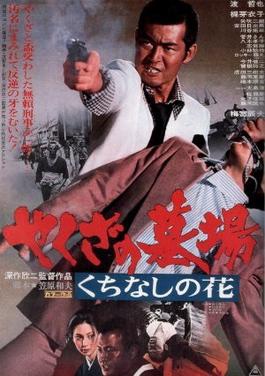
Alright, cinephiles, lemme break it down for you about the king of Japanese badassery, Kinji Fukasaku! This dude wasn’t just directing flicks, he was orchestrating cinematic operas of violence, suspense, and a whole lotta style.
We’re talkin’ yakuza films, baby! Not your grandpappy’s samurai shootouts. Fukasaku ripped the Yakuza genre wide open with his “Battles Without Honor and Humanity” series. No romanticized honor codes here. These were brutal portraits of the modern Yakuza underworld, all shot with this raw, gritty energy that just punches you in the gut. It ain’t pretty, but damn is it captivating. It ain’t about honor, it’s about survival, about clawing your way to the top of a blood-soaked mountain of ambition.
But Fukasaku wasn’t a one-trick pony. Dude hopped genres like a kung fu master. “Doberman Cop”? Pure, uncut copsploitation brilliance. Shinichi “Sonny” Chiba kicking ass and cracking wise? That’s a goddamn Tarantino wet dream right there.
And then, the man pulls a fast one! Fukasaku wasn’t a one-trick pony. Dude throws a curveball with “Battle Royale.” School kids forced to kill each other on a deserted island? Whoa, Nelly! This ain’t your Saturday morning cartoon. It’s a social commentary disguised as a bloodbath, and it’s brilliant.
A film so ahead of its time, it’s still shocking today. Kids forced to fight to the death on a deserted island? Damn, Fukasaku wasn’t afraid to push boundaries, to make you squirm in your seat while simultaneously blowing your mind.
But here’s the thing I dig most about Fukasaku – the man wasn’t afraid to get weird. He throws in these unexpected bursts of humor, these pop culture references that come outta nowhere, like a disco ball in a sushi bar. It keeps you off-kilter, man. You never know what’s gonna happen next. Here’s the thing about Fukasaku,
He wasn’t just about the blood splatter. Sure, the violence is balletic, operatic even, but it’s there for a reason. It’s a commentary, a brutal reflection of a society teetering on the edge. He understood the power of juxtaposition, of a perfectly placed pop song cutting through the tension, a quirky character emerging from the carnage. It’s all about the rhythm, the unexpected breaks that make the violence hit even harder.
Absolutely! Fukasaku’s influence on Takeshi Kitano, or should I say Beat Takeshi for the old-school fans, is like gasoline on a fire. Kitano, the comedian turned accidental auteur, was supposed to star in Fukasaku’s “Violent Cop” but fate, or maybe a scheduling conflict intervened. Fukasaku had to step out, leaving Kitano to take the director’s chair for the first time.
Now, Kitano had zero directing experience, but here he was staring down the barrel of a genre Fukasaku practically redefined. It’s like learning to drive on a Formula One racetrack – baptism by fire, baby! But guess what? Kitano took the wheel and damn near pulled a drift.
Sure, “Violent Cop” ain’t as operatically violent as a Fukasaku masterpiece, but there’s a rawness, a dark humor there that’s pure Kitano. The unexpected cuts, the juxtaposition of silence and sudden brutality – that’s Fukasaku’s influence bleeding through.
Here’s the thing, Kitano took Fukasaku’s foundation and built his own twisted skyscraper on it. Fukasaku explored the brutal reality of the Yakuza, Kitano took it a step further, adding a layer of existential emptiness, a deadpan humor that makes you laugh while feeling vaguely unsettled. Films like “Sonatine” are a perfect example – a Yakuza flick where the gangsters are more lost souls than hardened criminals. The violence is still there, but it’s punctuated by moments of silence that stretch on like an uncomfortable pause in a bad joke.
So, Fukasaku was the kick in the pants that launched Kitano’s directorial career. He took the brutal energy of Fukasaku’s Yakuza films and infused them with his own dark comedic sensibilities. The result? A whole new generation of cinephiles discovering the beauty of a perfectly placed gunshot wound and a deadpan stare.
So, next time you’re craving a film that’ll punch you in the gut, make you think, and leave you humming the damn soundtrack, check out Kinji Fukasaku. This ain’t some museum piece, this is pure, uncut cinematic adrenaline. Now go forth and experience the Fukasaku fury!